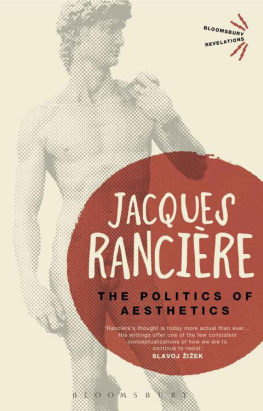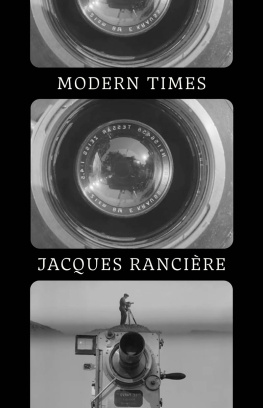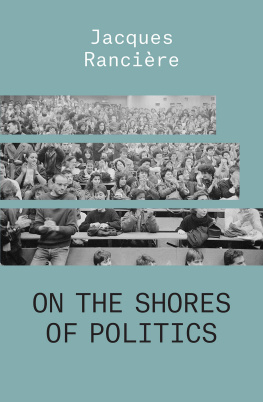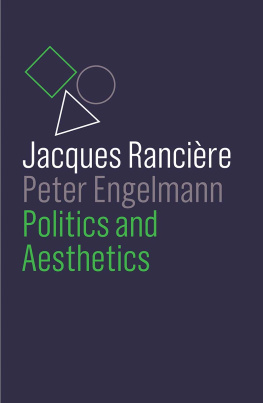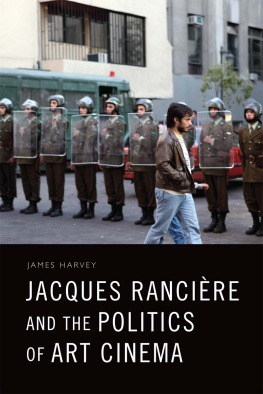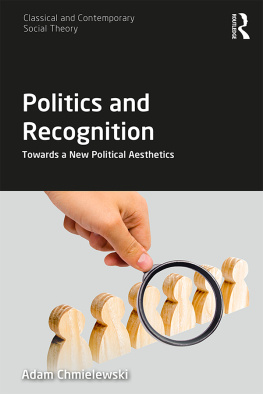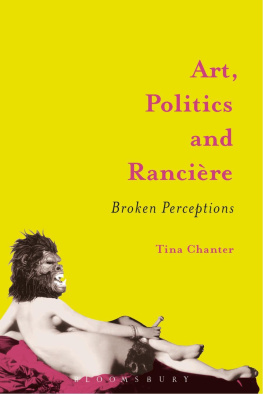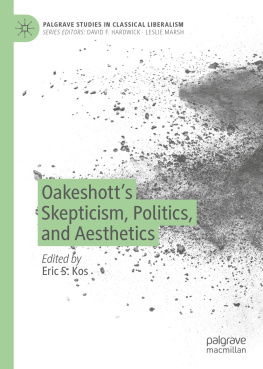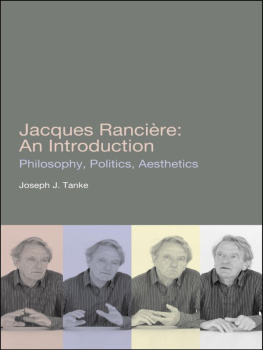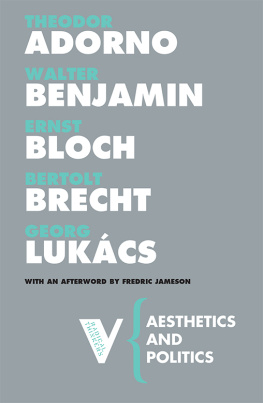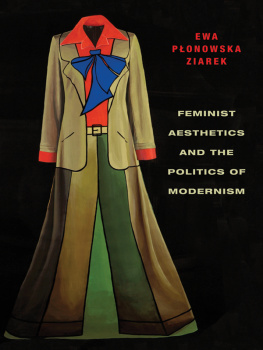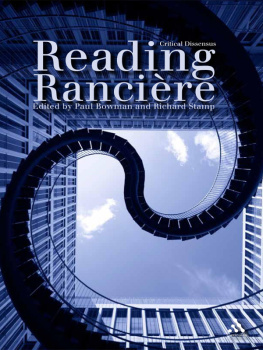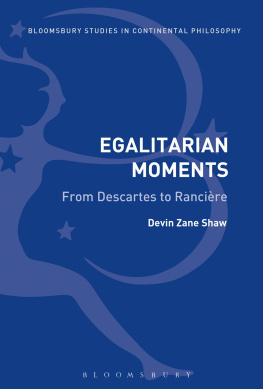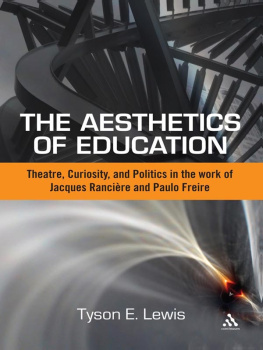TITLES IN THE BLOOMSBURY REVELATIONS SERIES
Aesthetic Theory, Theodor W. Adorno
On Religion, Karl Barth
The Intelligence of Evil, Jean Baudrillard
In Defence of Politics, Bernard Crick
Intensive Science and Virtual Philosophy, Manuel DeLanda
A Thousand Plateaus, Gilles Deleuze and Flix Guattari
Anti-Oedipus, Gilles Deleuze and Flix Guattari
Taking Rights Seriously, Ronald Dworkin
Discourse on Free Will, Desiderius Erasmus and Martin Luther
Education for Critical Consciousness, Paulo Freire
To Have or To Be?, Erich Fromm
Truth and Method, Hans Georg Gadamer
All Men Are Brothers, Mohandas K. Gandhi
Eclipse of Reason, Max Horkheimer
After Virtue, Alasdair MacIntyre
Time for Revolution, Antonio Negri
The Politics of Aesthetics, Jacques Rancire
An Actor Prepares, Constantin Stanislavski
Building a Character, Constantin Stanislavski
Creating a Role, Constantin Stanislavski
Some titles are not available in North America.
The Politics of
Aesthetics
The Distribution of the Sensible
Jacques Rancire
Edited and translated by Gabriel Rockhill

Bloomsbury Academic
An imprint of Bloomsbury Publishing Plc
50 Bedford Square London WC1B 3DP UK
175 Fifth Avenue New York NY 10010 USA
www.bloomsbury.com
First published in France under the title Le Partage du sensible: Esthtique et politique
La Fabrique-ditions, 2000
Gabriel Rockhill, 2004
First Published 2004
Reprinted 2005
Paperback edition first published 2006
Reprinted 2006, 2007 (twice), 2008, 2009, 2010, 2011
This paperback edition first published in 2013 by Bloomsbury Academic
All rights reserved. No part of this publication may be reproduced or transmitted in any form or by any means, electronic or mechanical, including photocopying, recording, or any information storage or retrieval system, without prior permission in writing from the publishers.
No responsibility for loss caused to any individual or organization acting on or refraining from action as a result of the material in this publication can be accepted by Bloomsbury Academic or the author.
British Library Cataloguing-in-Publication Data
A catalogue record for this book is available from the British Library.
ISBN: 978-1-7809-3687-1
Library of Congress Cataloging-in-Publication Data
A catalog record for this book is available from the Library of Congress.
Contents
The Reconfiguration of Meaning
Gabriel Rockhill
Translation is often deplored, with a sense of self-satisfied disillusionment, as an impossible project. Since there are no objective criteria for evaluating the relationship between the source language and the target language, it is claimed that the latter remains fundamentally undetermined by the former. This situation has given birth to a myriad of possible responses: the cynical condemnation of all translation, the enthusiastic acceptance of the archipelago of independent language games, the valorization of translation as a unique form of writing with its own properly literary forms, the celebration of the abyss separating languages as an aesthetico-ethical opportunity to introduce a Proustian langue trangre dans la langue
These various reactions are at least correct in one respect: they reject the purportedly universal criteria of translation argued for by their adversaries (the deep structure of all discourse or the pure language whose echo can be heard in the interstices between individual languages). Nonetheless, this very polarization between universal translatability and the utter impossibility of a faithful rendering of the original not to mention the middle ground cunningly occupied by those who declare translation to be at once possible and impossible is in fact dependent on concrete criteria that provide an overall framework for thinking about translation.
In fact, these categories can only operate within a general logic of signification that confers meaning on them by situating them in a relational network. This explains why they are not even necessarily distributed according to the oppositions they appear to fall within and do not simply exist as empty categories whose content is provided by each new epoch. To put this point rather succinctly, the very meaning of translation and all of its corresponding parts cannot be separated from the historical situation within which it functions.
The second major criterion is social. In order for a translation to be recognized as such and considered worthy of the name, it has to abide by the broad parameters operative in a particular community. These parameters need not necessarily impose a single model or method of translation, but they define the general coordinates within which translation can be distinguished from other discursive procedures. Each community establishes a logic of signification that presupposes a specific understanding of what meaning is, how it operates, the normative principles it should abide by, its function in social discourse, etc. Communities do, of course, come into conflict both with themselves and with other communities , but the basic point remains unchanged: just as the translator never works in a historical vacuum, translation is never an isolated soliloquy uninformed by a community. In short, translation is neither based on universal criteria nor is it condemned to a solitary encounter with the intractable original. It is a historical practice that always takes place implicitly or explicitly within a social framework.
This means that translation, as I propose to understand it under the current circumstances, is not simply a form of mediation between two distinct languages. It is a relational reconfiguration of meaning via a logic of signification that is rendered possible by a socio-historical situation. This process can, in fact, take place within a single language, which does not however mean that understanding itself is an act of translation or that we are condemned to endlessly paraphrasing our original ideas. An alternate logic of signification can actually use the exact same words to mean something entirely different because it determines the very structure of meaning, the horizons of what is qualified as language, the modi operandi of words and sentences, the entire network that defines the process of signification. Thus, when translation does occur between two languages, the overall logic of signification is often more important than the differences between the languages themselves because it determines the very limits between these two languages, how meaning operates in each of them, the semantic relationships that need to be preserved and those that can be discarded, etc.
Prior to being a choice about certain words, the act of translation is a choice concerning the logic of signification in which these words function. In the case of the present translation, I have chosen to distance myself from one of the dominant methods of translation for rendering contemporary French intellectuals in English, which is historically the heir to a logic of signification based on the inviolable sacred status of the original text. This method has led to the use of every possible typographical and etymological artifice to prove with indisputable success in some cases that it is impossible to translate between different languages. The end result has often been a sacred jargon of authenticity that is cunningly appropriated by the high priests of the unknown in order to reconstruct the original syntax behind the translation and unveil the unsaid in the said. Thus, in spite of its obsessive preoccupation with the impossibility of grasping the original text, this method of translation is paradoxically based on establishing the greatest possible typographic proximity to the sacred original. In fact, the ultimate telos of this method can only be described in terms of an asymptote where the vertical axis would be the verbatim identity between the translation and the original work (whose ultimate consequences were deduced by Borges Pierre Menard).
Next page
